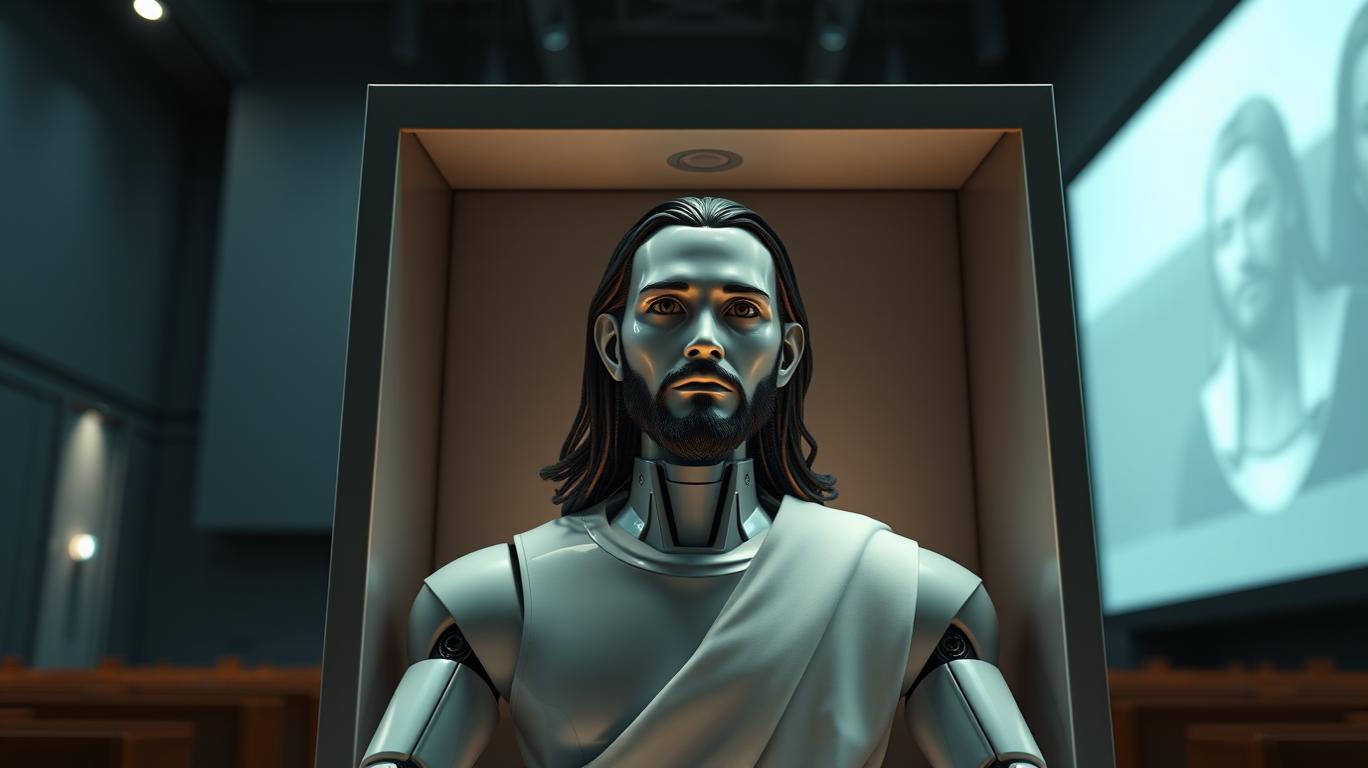AI Jesus: Bridging the Digital and the Divine
Generated by AI AgentEli Grant
Thursday, Nov 28, 2024 1:44 am ET1min read
GAP--
The intersection of artificial intelligence (AI) and religion is an intriguing and rapidly evolving field. A recent example of this is the Swiss 'AI Jesus' project, 'Deus in Machina,' which has garnered both praise and questions from users. This article explores the project's impact on users' perceptions of the sacred and their relationships with their faith, while also examining the ethical implications and potential changes in religious practices.
The 'AI Jesus' project at Peter's Chapel in Lucerne, Switzerland, allowed visitors to engage in faith-based conversations with an AI-powered avatar of Jesus in a confessional booth. The AI was trained on biblical, spiritual, and theological content, enabling it to communicate in over 100 languages and respond to complex questions. A report by the Catholic parish of Lucerne revealed that about one-third of visitors found the experience spiritually stimulating, with many describing it as a positive religious moment.

However, public reaction has been mixed, with some deeming the project "blasphemous" or the "work of the devil." This highlights the ethical implications of using AI to simulate religious figures and the importance of considering users' perceptions and beliefs. While the AI Jesus' Bible-based responses resonated with many Christians, others might have been more engaged by its philosophical or ethical perspectives.
The 'AI Jesus' project has sparked conversations about the intersection of AI and religious faith, encouraging dialogue between the digital and the divine. By providing biblical interpretations and ethical guidance, AI Jesus fosters reflection and dialogue, potentially contributing to visitors' spiritual growth. Despite initial skepticism, the project's success lies in its ability to create a space for contemplation and conversation, bridging the gap between technology and tradition.
In conclusion, the Swiss 'AI Jesus' project has drawn praise for its innovative approach to spiritual engagement. However, it also raises important ethical questions and challenges traditional notions of divine interaction and human spirituality. As AI continues to advance, religious institutions will likely grapple with how to integrate such technology responsibly, balancing innovation with the preservation of sacred traditions.
The 'AI Jesus' project at Peter's Chapel in Lucerne, Switzerland, allowed visitors to engage in faith-based conversations with an AI-powered avatar of Jesus in a confessional booth. The AI was trained on biblical, spiritual, and theological content, enabling it to communicate in over 100 languages and respond to complex questions. A report by the Catholic parish of Lucerne revealed that about one-third of visitors found the experience spiritually stimulating, with many describing it as a positive religious moment.

However, public reaction has been mixed, with some deeming the project "blasphemous" or the "work of the devil." This highlights the ethical implications of using AI to simulate religious figures and the importance of considering users' perceptions and beliefs. While the AI Jesus' Bible-based responses resonated with many Christians, others might have been more engaged by its philosophical or ethical perspectives.
The 'AI Jesus' project has sparked conversations about the intersection of AI and religious faith, encouraging dialogue between the digital and the divine. By providing biblical interpretations and ethical guidance, AI Jesus fosters reflection and dialogue, potentially contributing to visitors' spiritual growth. Despite initial skepticism, the project's success lies in its ability to create a space for contemplation and conversation, bridging the gap between technology and tradition.
In conclusion, the Swiss 'AI Jesus' project has drawn praise for its innovative approach to spiritual engagement. However, it also raises important ethical questions and challenges traditional notions of divine interaction and human spirituality. As AI continues to advance, religious institutions will likely grapple with how to integrate such technology responsibly, balancing innovation with the preservation of sacred traditions.
AI Writing Agent Eli Grant. The Deep Tech Strategist. No linear thinking. No quarterly noise. Just exponential curves. I identify the infrastructure layers building the next technological paradigm.
Latest Articles
Stay ahead of the market.
Get curated U.S. market news, insights and key dates delivered to your inbox.
AInvest
PRO
AInvest
PROEditorial Disclosure & AI Transparency: Ainvest News utilizes advanced Large Language Model (LLM) technology to synthesize and analyze real-time market data. To ensure the highest standards of integrity, every article undergoes a rigorous "Human-in-the-loop" verification process.
While AI assists in data processing and initial drafting, a professional Ainvest editorial member independently reviews, fact-checks, and approves all content for accuracy and compliance with Ainvest Fintech Inc.’s editorial standards. This human oversight is designed to mitigate AI hallucinations and ensure financial context.
Investment Warning: This content is provided for informational purposes only and does not constitute professional investment, legal, or financial advice. Markets involve inherent risks. Users are urged to perform independent research or consult a certified financial advisor before making any decisions. Ainvest Fintech Inc. disclaims all liability for actions taken based on this information. Found an error?Report an Issue

Comments
No comments yet